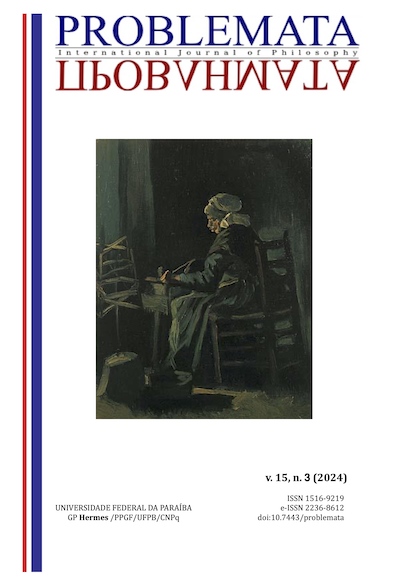PHILOSOPHICAL TEXTURE OF FORGIVENESS:
EXPLORING THE LIMIT OF THE UNFORGIVABLE
DOI:
https://doi.org/10.7443/problemata.v15i3.69884Keywords:
Memory, History, Guilt, Evil, FreedomAbstract
Forgiveness is a complex reality that transcends the dichotomy of "forgivable and unforgivable." Ricoeur, in his work "La mémoire, l´histoire, l´oubli," highlights its centrality as an expression of the limits of justice. Forgiveness cannot be institutionalized, but it has political and poetic dimensions, influencing collective imagination and nurturing the identity of peoples. It creates a temporality, sustaining happy relationships and just institutions. Forgiveness faces ethical dilemmas, such as the relationship between asking for forgiveness and confessing guilt, but Ricoeur encourages us to consider it as a possibility to start anew, reflecting the human capacity to act and seek reconciliation. This summary highlights the complexity of forgiveness and its importance in building a more compassionate and just world.
Downloads
References
ARENDT, Hannah. A condição humana. Rio de Janeiro: Forense, 2001.
ARENDT, Hannah. La condition de l´homme moderne. Paris: Agora, 2004.
ARENDT, Hannah. Origens do totalitarismo. São Paulo: Companhia das Letras, 1989.
ARENDT, Hannah. Responsabilidade pessoal sob a ditadura. In: ______. Responsabilidade e julgamento. São Paulo: Companhia das Letras, 2004. p. 175-192.
CAUSSE, Guilhem. Paul Ricoeur: mal et pardon. Paris: Éditions Facultés jésuites de Paris, 2013.
COLE, Phillip. The Myth of Evil. Edinburgh: University of Edinburgh Press, 2006.
DERRIDA, Jacques et al., Forgiveness: A Roundtable Discussion with Jacques Derrida, in Questioning God, ed. Caputo, Dooley, and Scanlon. Bloomington: Indiana University Press, 2001.
GARRARD, Eve. Forgiveness and the Holocaust. Ethical Theory and Moral Practice, [S.l.], v. 5, n. 2, p. 147–165, jun. 2002.
GOVIER, Trudy. Forgiveness and the Unforgivable. American Philosophical Quarterly, [S.l.], v. 36, n. 1, p. 59–75, 1999.
GRISWOLD, Charles. Forgiveness: A Philosophical Exploration. New York: Cambridge University Press, 2007.
GREISCH, Jean. Le buisson ardent et les lumières de la raison. L´invention de la philosophie de la religion. Paris: Cerf, 2004.
JANKÉLÉVITCH, Vladimir. L´irréversible et la nostalgie. Paris: Champs Essais, 2011.
LANG, Berel. Forgiveness. American Philosophical Quarterly, [S.l.], v. 30, p. 105–117, 1994.
MORTON, Adam. On Evil. New York: Routledge, 2004.
PERRONE-MOISÉS, Cláudia. Os limites do perdão: Hannah Arendt e Jacques Derrida. Revista brasileira de Psicanálise, São Paulo, vol.48 no.4 set./dez. 2014.
PETTIGROVE, Glen. Forgiveness and Love. Oxford: Oxford University Press, 2012.
PETTIGROVE, Glen. Hannah Arendt and Collective Forgiving. Journal of Social Philosophy, [S.l.], v. 37, n. 4, p. 483–500, 2006.
PETTIGROVE, Glen. Hume on Forgiveness and the Unforgivable. Utilitas, [S.l.], v. 19, 447–465, dez. 2007.
RICOEUR, Paul. La critique et la conviction. Paris: Calmann-Lévy, 1995.
RICOEUR, Paul. La mémoire, l´histoire, l´oubli. Paris: Seuil, 2000.
RICOEUR, Paul. Penser la Bible. Paris: Seuil, 1998.
RICOEUR, Paul. Vivant jusqu´à la mort. Suivi de Fragments. Paris: Seuil, 2007.
RUSSEL, Luke. Evil and the Unforgivable. In: CRISP, Roger; HARROSH, Shlomit (org.). Moral Evil in Pratical Ethics. 1.ed. New York: Routledge, 2019. p. 201-222.
Downloads
Published
Issue
Section
License
Copyright (c) 2024 René Dentz, Gustavo Santos

This work is licensed under a Creative Commons Attribution 4.0 International License.
Authors who publish with this journal agree to the following terms:
- Authors retain copyright and grant the journal right of first publication with the work simultaneously licensed under a Creative Commons Attribution License that allows others to share the work with an acknowledgement of the work's authorship and initial publication in this journal.
- Authors are able to enter into separate, additional contractual arrangements for the non-exclusive distribution of the journal's published version of the work (e.g., post it to an institutional repository or publish it in a book), with an acknowledgement of its initial publication in this journal.
-
- Authors are permitted and encouraged to post their work online (e.g., in institutional repositories or on their website) prior to and during the submission process, as it can lead to productive exchanges, as well as earlier and greater citation of published work (See The Effect of Open Access).





